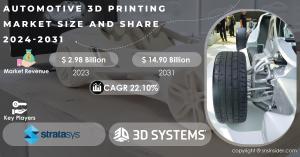ARTICLE AD BOX
Automotive 3D Printing Market Size, Share, Growth Analysis and Forecast 2031
— SNS Insider
AUSTIN, TEXAS, UNITED STATES, April 18, 2024 /EINPresswire.com/ — The Automotive 3D Printing Market was valued at USD 2.98 Billion in 2023 and is projected to reach USD 14.90 Billion by 2031, reflecting a compound annual growth rate (CAGR) of 22.10% throughout the forecast period.
The Automotive 3D Printing Market is experiencing a surge in demand, fueled by its ability to revolutionize traditional manufacturing processes. This innovative technology offers a unique approach to creating three-dimensional objects by layering material, enabling significant benefits such as personalization, rapid prototyping, and cost-effective production of complex components. The market encompasses a diverse range of applications, including the creation of car parts, tools, interior components, and even functional automobiles. As automakers prioritize efficiency and customization, 3D printing is emerging as a transformative solution, streamlining supply chains, shortening lead times, and minimizing material waste.
Get Sample PDF of Automotive 3D Printing Market Report @ https://www.snsinsider.com/sample-request/2250
Leading Key PLayers of Automotive 3D Printing Market
Stratasys (Israel)
3D Systems (US)
Desktop Metal (US)
EOS (Germany)
Arcam AB (Sweden)
Renishaw plc. (UK)
HP (US)
Buggati
EPlus3D (China)
Materialise (Belgium)
Carbon (US)
SLM Solutions Group AG (Germany)
Voxeljet (Germany)
Farsoon Technologies (China) and Sinterit (Poland)
Protolabs (US)
Nexa3D (US)
Ultimaker (Netherlands)
Key Drivers Propelling the Automotive 3D Printing Market
The continued advancements in additive manufacturing technologies are a primary driver of the Automotive 3D Printing Market. Manufacturers are increasingly employing processes like Selective Laser Sintering (SLS), Fused Deposition Modeling (FDM), and Stereolithography (SLA) to create lightweight yet robust components.
The Automotive 3D Printing Market is witnessing continuous advancements, with key players making strategic investments to enhance their offerings.
In May 2022 Renishaw, a prominent manufacturer of industrial 3D printers, launched a new series of RenAM 500 machines. These machines, including the RenAM 500S Flex (single laser) and RenAM 500Q Flex (four-laser), boast streamlined powder handling systems, making them ideal for research and development, pre-production, and bureau environments.
In February 2022 3D Systems, a leading provider of 3D printing solutions, expanded its capabilities by acquiring Titan Additive LLC. Titan, a global leader in polymer extrusion technology, broadens the material options available to 3D Systems’ clients, catering to a wider range of automotive 3D printing applications.
Market Segmentation
By Application
Prototyping & Tooling dominates the market due to the swiftness, ease, and cost-effectiveness of 3D printing in this segment.
By Technology
Fused Deposition Modeling (FDM) is the most prevalent technology due to its versatility in producing prototypes, concept model parts, and finished components.
By Material
Polymers are the most widely used material segment due to their strength and flexibility. However, the use of metals is anticipated to rise for printing parts requiring high-pressure and temperature tolerance.
For More Customized Data, Request for Report Customization @ https://www.snsinsider.com/enquiry/2250
Market Segmentation of Automotive 3D Printing
By Application:
Prototyping & Tooling
Research, Development & Innovation
Manufacturing Complex Components
Others
By Technology:
Stereolithography (SLA)
Selective Laser Sintering (SLS)
Electron Beam Melting (EBM)
Fused Deposition Modeling (FDM)
Laminated Object Manufacturing (LOM)
Three-Dimensional Inject Printing
Others
By Material:
Metals
Plastics
Composites and Resins
Others
Impact of Geopolitical Tensions
The Russia-Ukraine war has disrupted the supply chain of critical raw materials like metals and polymers, hindering the automotive 3D printing sector. The price fluctuations and resource limitations have compelled key players to reassess sourcing strategies and production schedules. The conflict has also impacted transportation and logistics, affecting the timely delivery of 3D-printed components. Industry leaders are actively mitigating these challenges by diversifying supply chains and exploring alternative sourcing options.
Key Regional Developments
North America currently holds the dominant position in the market due to stringent safety regulations and the presence of leading car manufacturers. However, the Asia-Pacific region is expected to witness the fastest growth rate due to factors like a burgeoning middle class, rising vehicle production, and government initiatives focused on improving road safety infrastructure. This growth is likely to narrow the market share gap between these regions in the coming years.
Access This Full Reserch Report @ https://www.snsinsider.com/reports/automotive-3d-printing-market-2250
Key Takeaways From Automotive 3D Printing Market Report
Gain a comprehensive understanding of the market’s projected growth trajectory, reaching USD 14.90 Billion by 2031 at a CAGR of 22.10%..
Stay informed about the latest advancements in additive manufacturing technologies influencing the market. Processes like SLS, FDM, and SLA are creating opportunities for lightweight yet durable components, driving innovation within the automotive industry.
Discover how rapid prototyping with 3D printing offers significant cost and time savings. This translates to faster design iterations and accelerated product development cycles for your automotive projects.
Learn how 3D printing aligns with the growing emphasis on sustainable practices. By enabling the production of lighter components, 3D printing contributes to improved fuel efficiency and reduced emissions, a crucial factor for future automotive development.
Identify the Asia-Pacific region as a key growth market for automotive 3D printing. This region presents significant opportunities due to its expanding middle class, rising vehicle production, and government support for 3D printing technologies.
Table of Content- Major Points
1. Introduction
2. Research Methodology
3. Market Dynamics
4. Impact Analysis
5. Value Chain Analysis
6. Porter’s 5 forces model
7. PEST Analysis
8. Automotive 3D Printing Market, By Application
9. Automotive 3D Printing Market, By Technology
10. Automotive 3D Printing Market, By Material
11. Regional Analysis
12. Company Profiles
13. Competitive Landscape
14. Conclusion
Continue….
Purchase This Exclusive Research Report @ https://www.snsinsider.com/checkout/2250
About Us:
SNS Insider is one of the leading market research and consulting agencies that dominates the market research industry globally. Our company’s aim is to give clients the knowledge they require in order to function in changing circumstances. In order to give you current, accurate market data, consumer insights, and opinions so that you can make decisions with confidence, we employ a variety of techniques, including surveys, video talks, and focus groups around the world.
Contact Us:
Akash Anand – Head of Business Development Strategy
Email: info@snsinsider.com
Phone: +1–415–230–0044 (US) | +91–7798602273 (IND)
Akash Anand
SNS Insider Pvt. Ltd
+1 415-230-0044
info@snsinsider.com
Visit us on social media:
Facebook
Twitter
LinkedIn
Instagram
YouTube
![]()
The content is by EIN Presswire. Headlines of Today Media is not responsible for the content provided or any links related to this content. Headlines of Today Media is not responsible for the correctness, topicality or the quality of the content.
The post Automotive 3D Printing Market Size is Predicated to Grow at CAGR of 22.10% From 2024-2031 appeared first on Headlines of Today.
.png)
 6 months ago
3
6 months ago
3

 ,
,







 English (US)
English (US)